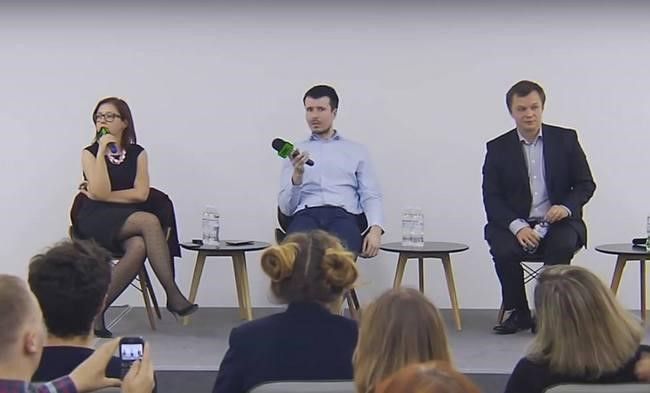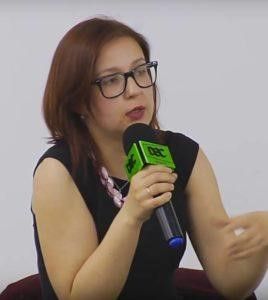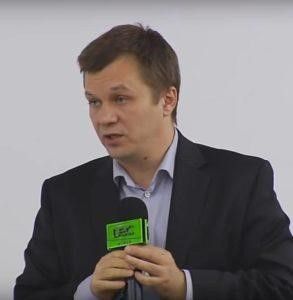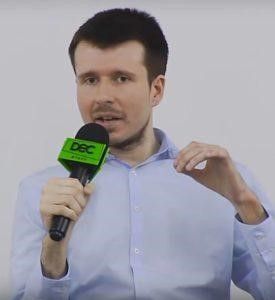People say that everything old is new again. But is this statement true for the education sector and its methods? Technological development impacts not only the conduct of business in large corporations and small companies alike, but innovative ideas penetrate all spheres of life, and can even change the approach to education.
Along with classical universities, ever greater popularity is being gained by online courses, which allow their participants not only to develop critical thinking but also to obtain graduate certificates in Data Science.
Will the university remain a place for obtaining a classic education, or will it be replaced with platforms like Coursera or Prometheus; how should the education system in Ukraine be developed; and should higher education provide practical skills? Tymofiy Mylovanov, Honorary President of the Kyiv School of Economics, and Ivan Prymachenko, cofounder of the platform of massive open online courses Prometheus, tried to answer these and other questions in a discussion that was part of the Ukraine Economy Week.

Screened from a Ukraine Economy Week video
The event was moderated by Inna Sovsun, Vice President of the Kyiv School of Economics and former Deputy Minister of Education and Science of Ukraine.
 Inna Sovsun: Talking about education in Ukraine, one can very frequently hear two radical viewpoints: either everything is bad here or everything is good here. Even more so, “let us not change anything, or else things may turn for the worse.” But is it really so?
Inna Sovsun: Talking about education in Ukraine, one can very frequently hear two radical viewpoints: either everything is bad here or everything is good here. Even more so, “let us not change anything, or else things may turn for the worse.” But is it really so?
Let us take a look at some statistics, especially at data concerning the way Ukrainian education is perceived on the international scene as well as directly by the country’s population. For example at the Global Competitiveness Index, which measures, inter alia, the level of perceived education quality in a country. On the whole, Ukraine is ranked among the world’s best for higher education outreach. In 2011 Ukraine ranked 46th on the state of higher education in the Global Competitiveness Index; in 2016 it rose to 34th place. According to the State Statistics Service of Ukraine, up to 80% of Ukrainian high school graduates go to universities.
At the same time, however, Ukraine’s education level rankings are lowest for business and management. Yet the country’s education fares quite well on mathematics and natural sciences. The reason is clear to see: in those areas, “the old school” has been preserved.
How should the Ukrainian system of higher education be developed in the future? A look at the Ukrainian statistics reveals that the index of higher education perception by the country’s population differs somewhat from the international one. According to sociological survey data, in 2011 nearly 40% of Ukrainian students believed that the quality of education in Ukraine was most likely high. But in 2015 the respective share dropped to 17%. How can this fall be accounted for? In the first place, it can be related to increased demand for quality education. A very important factor is the recently expanded access to sources of knowledge. We realize how diverse higher education can be.
Moreover, the evaluation of the general level of higher education by Ukrainian teachers differs dramatically from the assessment of their own university. Survey results show that students and teachers alike consider the level of higher education in their university to be higher than that of Ukraine in general. Often we are unable to assess the problem in terms of departments, faculties, universities, etc. Actually, that lack of critical attitude towards the things around us makes it very hard to change anything. Yet changes must be initiated from the bottom up.
Ivan Prymachenko: I will start with forecasts for the future. I think that offline education is dying and that there won’t be any classical universities in just about 20 years from now. Even if they remain, they will be perceived in much the same way that teaching based on using printed textbooks is perceived at present. But the prospects lie elsewhere: the greatest potential of online teaching is associated with a mixed format. Online education will become the foundation for developing other educational innovations on the basis of massive open online courses. Mixed teaching is an innovation in itself.
There’s one more aspect. Everyone has heard about the Minerva Project. It’s a new university in the United States. Its aim is to directly compete with Harvard or Stanford. Whether that will happen is a wait and see question. However, this year the Minerva School received more applications per vacancy than did the above-mentioned famous universities. In that school, teaching is conducted primarily in the online mode. The advantage consists in students’ direct access to the best teachers in the country and worldwide.
 Tymofiy Mylovanov: Online-education in its current form is charlatanry. Classical education makes people change. We learn new things, try to resolve our current problems, and finally, become totally different persons. Education does not mean that you must learn a coding language, mathematics, or economics. When you study, then, above all, you change from within; you start living in a different way. In Ukraine, I received no real education. I received it later, in the United States, when studying in a PhD program.
Tymofiy Mylovanov: Online-education in its current form is charlatanry. Classical education makes people change. We learn new things, try to resolve our current problems, and finally, become totally different persons. Education does not mean that you must learn a coding language, mathematics, or economics. When you study, then, above all, you change from within; you start living in a different way. In Ukraine, I received no real education. I received it later, in the United States, when studying in a PhD program.
To become an Olympic champion, you have to train hard every day. Besides, you must have a coach whose aim is to “break” you every day. I don’t deny that there are uniquely gifted individuals who may become champions after watching a match on YouTube. I think all understand that it will be very hard to achieve high results, even if you carefully imitate the technique and punches of a sportsman in a video. This is true for all types of activities.
In any field, it is important to cooperate with people who choose you from among hundreds of others. Those are your mentors.
I don’t rule out that online courses do provide some knowledge; but it’s superficial. Real knowledge emerges only when you seriously compete with your peers. When you are struggling for a place in the sun in the real world.
I hope very much that in the future we will be able to conceptually integrate new online education methods into the classical education system. But to do so, a mechanism must be found that will prompt people to seriously compete against one another.
I partially agree with Ivan’s statement that soon most universities will vanish, especially in Ukraine. At this point, they are of no value for the country; in fact most of them teach how to resolve problems, without providing any real knowledge. Another problem of online education is funding. Why is Harvard or University of Pennsylvania not interested in online education? It’s because they take care to uphold their reputation. Yes, they will have 20 graduates instead of 2,000; but they will know their graduates will be part of the intellectual elite.
How does the offline or online education format influence the teachers? How do teachers develop themselves when not working regularly on preparation for lectures and classes? And what is their motivation for self-improvement and self-development when they work as a moderator and actually try to clarify a fact being explained by another teacher?
 Prymachenko: In my opinion it’s the other way round: online and mixed teaching provides teachers with opportunities to get rid of routine work. By and large, those are the same lectures as before, except that they are delivered online. Integrated online courses release the lecturer from the need for routine reading of material while providing a lot of extra time for work with the students.
Prymachenko: In my opinion it’s the other way round: online and mixed teaching provides teachers with opportunities to get rid of routine work. By and large, those are the same lectures as before, except that they are delivered online. Integrated online courses release the lecturer from the need for routine reading of material while providing a lot of extra time for work with the students.
I would like to briefly respond to some of the points raised by Tymofiy. It is highly essential for people to change the paradigm of perception of education. Competition and tutorship are very important components of classical teaching. On the other hand, however, these are its greatest problem. When you enter an ordinary school or a university, it’s a decision that the system has made long ago instead of you. This is very convenient: you are permanently under supervision, direction and coercion to study. But what happens when your studies are over? There is no one in real life to make decisions instead of you. No one else but you will design a plan for your life. You must do it on your own. But the school and the institute of higher education have already taught you that it will be done by someone other than you.
Today, one of the most important ideas of education is the autonomy of pupils and students. It is up to them to decide how and where they will receive education. When they enter the real life, it will be too late to learn this. Online courses provide us with the opportunity to change the format of education. Therefore, the combined mode is the road to the future.
I will also say a few words about the financial aspect. Talking about finances, Coursera managed to make a rather substantial profit; Udacity became a startup. Its capitalization exceeded $ 1 billion. Actually, it can no longer be referred to as massive open online courses; “massive closed online courses” would be a more appropriate description. One has to pay for access. At least in the West, the financial side of business is in fact very stable.
Now let us imagine a standard Ukrainian institute of higher education. You bring your state-type diploma to your employee. But what will it tell him about you? Nothing. By and large, you may have been a student; but you may have also bought this diploma. It’s such a dark, black box inside which one cannot see anything.
Mylovanov: Now I will refute all of these four claims. The first claim – that an offline university diploma is of no value at all. It’s of zero value, while the online diploma value will keep on rising.
Prymachenko: In Ukraine.
Mylovanov: Let’s not talk about Ukraine right now. It’s a problem, but it has nothing to do with our conversation about offline education. For example your Prometheus online is good, but I will make a bad online service. Hence the value of your online diploma will be zero. In Ukraine there are universities such as NaUKMA, Kyiv School of Economics, Shevchenko University, some departments at the KPI, Kharkiv, Donetsk, Odesa universities, with diplomas that are of some value after all. But there also exists Uryupinsk University or a School of Obscure Economics, with diplomas that are probably not worth a dime.
The second claim says that the modern university completely chooses the curriculum for the student. This is an erroneous statement. In modern American or European universities, students choose education courses for themselves. In online courses, you similarly tell people what they should do. For example, if you wish to receive a Data Science certificate and take a Coursera course, you will have to pass specific tests.
As regards the claim that lectures are a routine. This is not so. Universities get high ratings if they employ professional lecturers. They literally chase after quality staff. Their salaries may be 10 to 20 times higher compared to nonprofessional lecturers, because lecturing is an artistic performance. As to funding – high capitalization does not mean a stable business model.
Today’s objective of the university is to teach an individual to compete with him-/herself. It is not quite clear to me how this skill can be taught online. Nor is it quite clear to me how this can be taught offline. We do not look at things quite correctly. I don’t think that in the next 10 to 20 or even 50 years a Coursera certificate will be better than a UPenn diploma.
Why then are online courses so popular in Ukraine? It’s probably because most Ukrainians have no access to quality education at universities. Therefore, we need online education to give them a chance, similarly to residents of Kyiv or other cities, to get a good job.
What kind of education should there be in Ukraine? Is there a need for specialized lyceums or gymnasiums enrolling the most talented children and investing all available resources in them? Or are secondary schools of good quality for all children more important to us?
Mylovanov: What are our individual viewpoints? Let us share them. Or let us toss a coin, so as to make things more interesting.
Ivan Prymachenko: I am in favor of the general education school.
Mylovanov: All right; in that case I will argue for the elite one. Let us see why it is necessary to focus on elite education.
Sovsun: But at what age should the selection of children be started?
Mylovanov: From the very first year of life. Once a baby has been born, an elite kindergarten, elite perambulator and diapers must be available for it. Talking seriously, resources are lacking. Ukraine is a poor country. But 80% of the people here go in for higher education. Secondary school achieves a very high yield per invested dollar. That is, secondary education in Ukraine is of a good quality level and that is a classy investment in society. Higher education for all is a bad investment in society.
Why? Because people attain higher education and then go to work for McDonalds. All of the 80% cannot find employment in their professional fields or develop science. There’s a demographic crisis in the country. We have no working class anyway; the amount of taxes paid is not enough to pay pensions. But we remove 80% of the young population from the turnover of life and make them study in low-quality universities. Instead of working, they grow dull there. We must realize that education is a privilege rather than a thing taken for granted. An individual must invest in that education, because in essence society pays for that individual. Especially in Ukraine. We are a poor society; we pay with our taxes for each student’s education and through taxes we suppress our business.
Prymachenko: The elite will stop being elitist very soon. Or will exist no longer, as a class. Justice is a different question – whether or not it is just to provide people with quality school or higher education.
We must realize that a kind of inflation of education is taking place at present – in the sense that we, as a civilization, have been accumulating more and more knowledge. And, naturally, we must learn more and more. We can optimize the rate of teaching people, but we cannot do this endlessly. In the Middle Ages, people could learn in a few years almost everything that mankind had previously invented. Nowadays, no matter how hard you study and how well you are being taught, this is impossible. But our objective is to provide practically everyone with a high level of education.
We must not refuse to provide education even to the weakest young learners. The weakest students can always get closer to the stronger ones if properly directed.

Screened from a Ukraine Economy Week video
Must higher education provide students with practical knowledge and skills? Or is it more important to teach theory after all? It’s a question that is probably always touched upon in discussions of Ukrainian higher education, especially when it comes to talking about employers. Absolutely all complain that higher education provides students with no practical skills, teaching them nothing but theory.
Prymachenko: What is practice and what is theory? Talking about practical knowledge as some kind of specific skills, well, I am not sure that they are worth paying a lot of attention. There is one very simple reason for this: fast development of artificial intelligence, which can already solve most algorithms and tasks for us. Accordingly, if we teach children or students such skills and algorithms, then we will be driving them automatically to the slaughterhouse. They will graduate from their university and remain unemployed. Talking about practice, we must necessarily teach them to think critically.
Sovsun: I will only ask a clarifying question. The ability to adapt – is it a practical skill?
Prymachenko: The existence of a species depends on its ability to adapt. Accordingly, I think that this is a highly practical skill.
Mylovanov: It is hard to challenge arguments that children should be taught to think critically and to adapt. But I will try to do so. Why is critical thinking unimportant? It’s because relationships and emotional skills are needed in the modern world. Why would you need critical thinking if you can simply write a post on Facebook that will emotionally appeal to people devoid of critical thinking? After that, you can even be appointed as deputy minister. Let us better start courses in proper writing of Facebook posts. I believe that in the current Ukrainian realities this skill is much more important than critical thinking.
The material was first published on Liga.Business
Main photo: depositphotos.com / bloomua
Attention
The authors do not work for, consult to, own shares in or receive funding from any company or organization that would benefit from this article, and have no relevant affiliations




